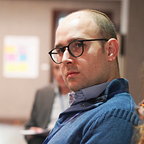What stops talented professionals from making progress
On the three obstacles that keep you — and your firm — from succeeding in what you do.
It’s been a year since I’ve decided to double down on my consulting practice. In the past year I’ve worked with very interesting clients, both for career consulting processes and for organizational development services. My impression is that among professionals in their early 40s, 30s and late 20s there is a deep, challenging conversation about the role of a career in one’s life and about how the professional experience can be more aligned with the individual’s lifestyle, needs and ambitions. The pandemic probably encouraged the development of the conversation but I don’t think that it changed significantly the direction of the conversation.
Here are three main patterns that I noticed:
1 / We are in the middle of a self-doubt pandemic.
Many professionals are convinced that they got to where they are because of luck, and that they don’t necessarily have the skills to succeed. That is true for CEOs and senior executives as for promising young professionals.
My assumption is that many professionals still think about the world of work with the same approach that our parents and grandparents had: you climb up the ladder by showing standard qualifications (degrees, certificates, awards) and by mastering very specific work processes (growing sales, optimize production, etc).
The latter has a lot of truth and I still think that it should be the leading vertical: you still need to deliver in order to make progress in your career.
However, the level of complexity and uncertainty in the market and in the workplace becomes higher and higher: technological innovation is moving faster and faster; firms develop complex strategies and partnerships; success depends on a constant juggling between regulation, operations and research. The ability to deal with these challenges is usually appreciated by every organizational leadership, even if its side-effect is a lower degree of excellence in the craft itself.
Younger generations are wired to deal with these challenges because they were born into a society and culture shaped by technology, complexity and multidisciplinarity. They don’t appreciate yet how valuable these abilities are, and therefore they keep using the old school parameters to evaluate themselves. The result is self-doubt, and it can affect deeply the ambitions and decisions of these professionals.
2 / Different generations are clashing in the workplace.
I don’t like talking about generations in the same way click-bait media trained us to talk. They overuse terms like Millennials, Gen Z, etc to generalize about huge — and incredibly diverse — groups of people. It’s not helpful. We all know people who are in their 20s but behave like Boomers.
We do know that most workplaces include representatives of different age groups, and each age group relates to “work” and to the workplace in a different way. Differences between how each generation relates to formality, authority, office politics, success measures, teamwork, decision making can be radical. When members from different age groups find themselves around the same table, these differences can be a dangerous trigger for disagreement. Power dynamics will then kick in, and the person with the highest status might decide to impose their own perspective. It can become an unproductive environment, both for the professionals in the room and for the firm.
No organization can make progress by marrying one and one only school of thought.
I’ll do my best to avoid here clichés on pluralism and diversity. Besides the moral side of the matter, it’s mostly a pragmatic issue: investing more time in levelling the intergenerational conversation than doing the actual work is not a great way to use the firm’s resources.
3 / Most professionals know only what happens next to their tree.
…and have no clue about how rich the forest is.
When a professional decides that they are tired of their job and they want to explore new professions or industries, they usually don’t know what options are available to them. They know their industry, a little bit about other industries where family members and friends work (usually with a low degree of diversity) but their acquaintance with the variety of disciplines, professions and job in the market is very little.
That is natural, but in a society where most people switch jobs or careers every 2 to 5 years, it can be limiting and frustrating. Switching jobs in the very same niche out of boredom doesn’t really make sense; work experiences in the same industry can vary, but not dramatically. The same is true for job descriptions. Also, most organizations will prefer a candidate with a wide skillset, together with a specific relevant expertise, rather than someone who zeroed-in on one field for their whole lives.
Career services in high school or university don’t really encourage an exploratory stage, where young professionals can learn more about the richness of the job market.
Career professionals can help with that. I will soon launch an online program that solves exactly that problem.
I do think that learning to be curious about other niches and professions, already in an early career stage, is key to a successful career. In the worst case — you learn something new about the market. In the best case, you are adding a new alternative to your own career roadmap.
Avy
For more insights on career and professional development, click here.
